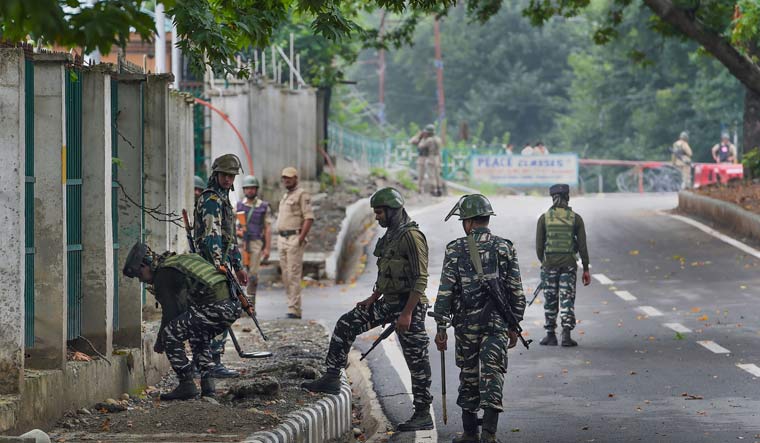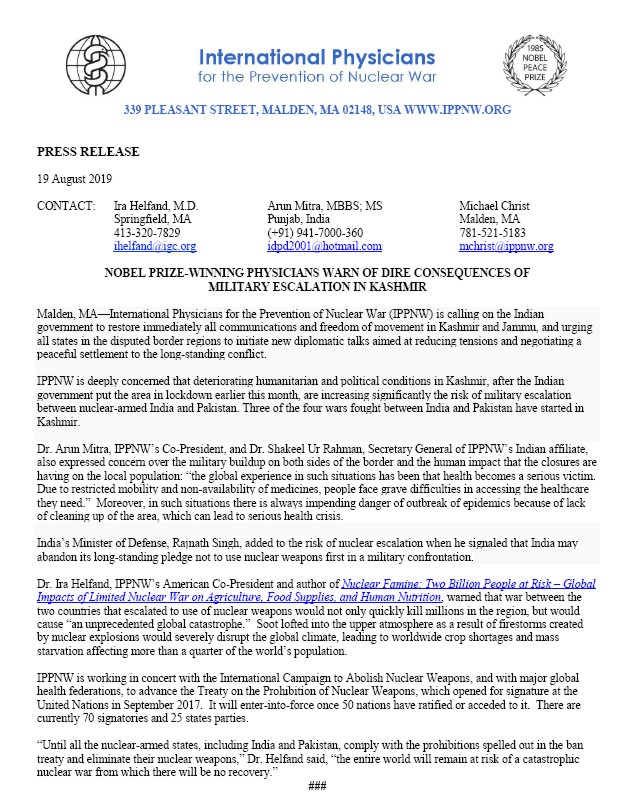International Physicians for the Prevention of Nuclear War (IPPNW) is calling on the Indian government to restore immediately all communications and freedom of movement in Kashmir and Jammu, and urging all states in the disputed border regions to initiate new diplomatic talks aimed at reducing tensions and negotiating a peaceful settlement to the long-standing conflict.

Image Courtesy: PTI
IPPNW is deeply concerned that deteriorating humanitarian and political conditions in Kashmir, after the Indian government put the area in lockdown earlier this month, are increasing significantly the risk of military escalation between nuclear-armed India and Pakistan. Three of the four wars fought between India and Pakistan have started in Kashmir.
Dr. Arun Mitra, IPPNW’s Co-President, and Dr. Shakeel Ur Rahman, Secretary General of IPPNW’s Indian affiliate, also expressed concern over the military buildup on both sides of the border and the human impact that the closures are having on the local population: “the global experience in such situations has been that health becomes a serious victim. Due to restricted mobility and non-availability of medicines, people face grave difficulties in accessing the healthcare they need.” Moreover, in such situations there is always impending danger of outbreak of epidemics because of lack of cleaning up of the area, which can lead to serious health crisis.
India’s Minister of Defense, Rajnath Singh, added to the risk of nuclear escalation when he signaled that India may abandon its long-standing pledge not to use nuclear weapons first in a military confrontation.
Dr. Ira Helfand, IPPNW’s American Co-President and author of Nuclear Famine: Two Billion People at Risk – Global Impacts of Limited Nuclear War on Agriculture, Food Supplies, and Human Nutrition, warned that war between the two countries that escalated to use of nuclear weapons would not only quickly kill millions in the region, but would cause “an unprecedented global catastrophe.” Soot lofted into the upper atmosphere as a result of firestorms created by nuclear explosions would severely disrupt the global climate, leading to worldwide crop shortages and mass starvation affecting more than a quarter of the world’s population.
IPPNW is working in concert with the International Campaign to Abolish Nuclear Weapons, and with major global health federations, to advance the Treaty on the Prohibition of Nuclear Weapons, which opened for signature at the United Nations in September 2017. It will enter-into-force once 50 nations have ratified or acceded to it. There are currently 70 signatories and 25 states parties.
“Until all the nuclear-armed states, including India and Pakistan, comply with the prohibitions spelled out in the ban treaty and eliminate their nuclear weapons,” Dr. Helfand said, “the entire world will remain at risk of a catastrophic nuclear war from which there will be no recovery.”
The statement may be read here:

Related